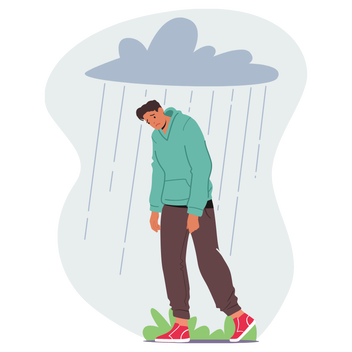Depression

Depression can stem from various causes and can be a distressing thing if you are a person of faith. You may be thinking, "If I'm a Christian, I am supposed to be full of hope and joy so how come I feel this way?" You are not alone, and your depression does not negate your faith. There is hope.
Causes of Depression
In some cases, there may be a biological reason why someone is depressed. Certain medical issues can worsen depression and other conditions (such as hypothyroidism) can even mimic it. Mood disorders may be genetic and often run in families. Depression can also result from trauma, which affects how one responds to fear and stress. Depression can also result and be compounded by negative thinking patterns.
Signs of Depression
According to the National Alliance on Mental Illness, "Depression can present different symptoms, depending on the person. But for most people, depressive disorder changes how they function day-to-day, and typically for more than two weeks." Some signs and symptoms include:
If you are struggling with symptoms of depression, the first step is to contact your primary care physician. Your doctor will be able to talk with you about any physiological factors that may be causing or worsening your depression. They may order blood work, prescribe medication (such as antidepressants), recommend lifestyle changes, and suggest counseling. Just as different people exhibit different symptoms of depression, people respond to different types of treatment.
Counseling can help you cultivate coping skills as well as recognize and change negative thinking patterns. If you are a person of faith, spiritually-integrated counseling can help you discover the resources of you faith, identify your values, and introduce you to spiritual practices that can help bring you personal insight, hope, and healing.
Causes of Depression
In some cases, there may be a biological reason why someone is depressed. Certain medical issues can worsen depression and other conditions (such as hypothyroidism) can even mimic it. Mood disorders may be genetic and often run in families. Depression can also result from trauma, which affects how one responds to fear and stress. Depression can also result and be compounded by negative thinking patterns.
Signs of Depression
According to the National Alliance on Mental Illness, "Depression can present different symptoms, depending on the person. But for most people, depressive disorder changes how they function day-to-day, and typically for more than two weeks." Some signs and symptoms include:
- Experiencing changes in sleep
- Having a change in appetite
- Not being able to concentrate
- Having a lack of energy
- No longer being interested in things you used to enjoy
- Feeling hopeless
- Being less active
- Feeling physical aches and pains
- Having suicidal thoughts
If you are struggling with symptoms of depression, the first step is to contact your primary care physician. Your doctor will be able to talk with you about any physiological factors that may be causing or worsening your depression. They may order blood work, prescribe medication (such as antidepressants), recommend lifestyle changes, and suggest counseling. Just as different people exhibit different symptoms of depression, people respond to different types of treatment.
Counseling can help you cultivate coping skills as well as recognize and change negative thinking patterns. If you are a person of faith, spiritually-integrated counseling can help you discover the resources of you faith, identify your values, and introduce you to spiritual practices that can help bring you personal insight, hope, and healing.
Counselors who provide this service:
The contents of this article are for informational purposes only and do not constitute medical advice; this content is not intended to be a substitute for professional medical advice, diagnosis, or treatment. Always seek the advice of a physician or other qualified health provider with any questions you may have regarding a medical condition. Never disregard professional medical advice or delay in seeking it because of something you have read in this article.



